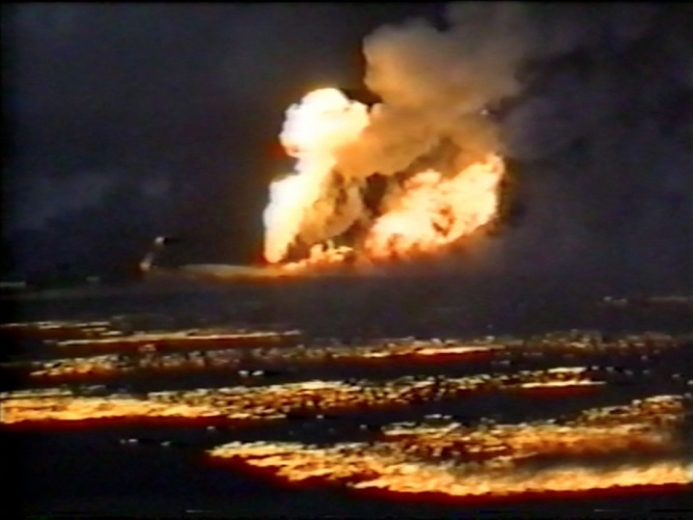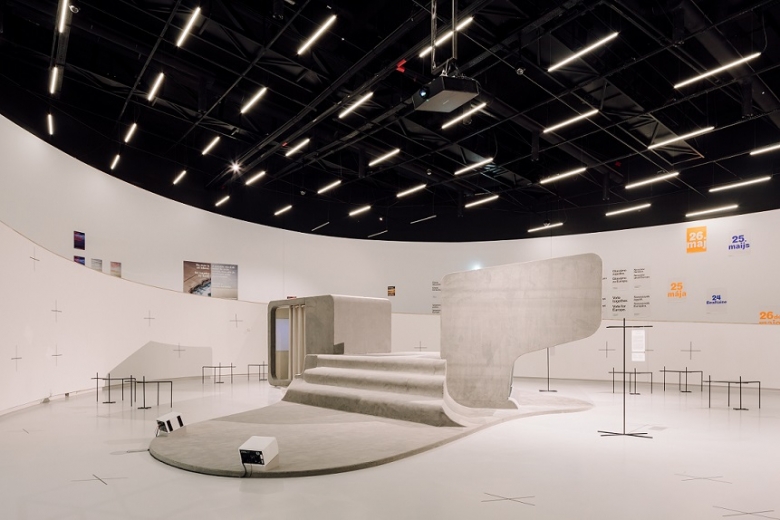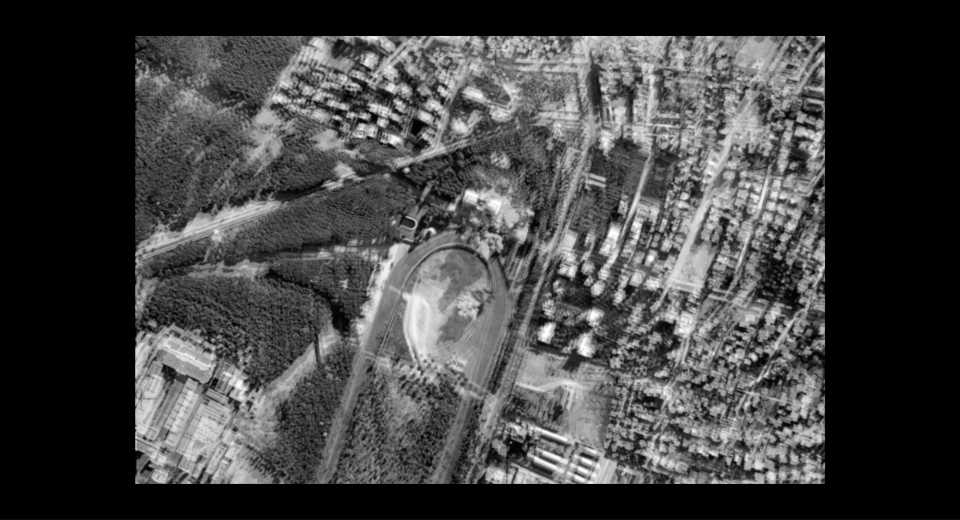
FILM PROGRAMME ART JAMEEL
In collaboration with maat, Art Jameel presents a series of moving image and video works, curated by Róisín Tapponi. The programme responds to the Tactile Cinema (2021) site-specific installation by Bricklab, which offers a multi-viewing space for filmmakers and visual artists from the Arab region.
Nine films, accompanied by a public programme, will be presented throughout the duration of the exhibition, addressing topics around human geographies, urban governance and architectural environments. The programme includes films by Ahmed Mater, Ahaad Alamoudi, Alaa Mansour, Sophia al Maria, Monira al Qadiri, Akram Zaatari, Alia Farid, Farah al Qasimi and Nadim Choufi.
From desert droughts to sci-fi cityscapes, the programme maps a geography of contradictions. Discord flourishes in a region where nationalism has failed, and where sci-fi is a vehicle of truth.
On view:
5 April – 26 May 2021
Ahmed Mater
(b. 1979, Saudi Arabia)
Leaves Fall in All Seasons, 2014
Digital video; 19 min 57 s
Art Jameel Collection
Leaves Fall in All Seasons is a film comprising mobile phone footage shot by migrant workers on building sites in and around Mecca from 2008 to 2013, a period that saw massive construction in and redevelopment of the city. The files were transferred to the artist’s phone using Bluetooth, while other materials were taken from YouTube.
Ahmed Mater documents and scrutinises the realities of contemporary Saudi Arabia. Forging an ongoing, complex mapping of the Kingdom, his practice explores collective memories to uncover and record unofficial histories.
Ahaad Alamoudi
(b. 1991, Saudi Arabia)
HENGLi, 2020
HD video; 6 min 45 s
In collaboration with Mengna Da
Courtesy of the artist and Athr Gallery, Jeddah
Shot in front of the United States Citizenship and Immigration Services office in New York, this video discusses notions of translation and preservation. A collaboration between artist Ahaad Alamoudi and curator Mengna Da, it imagines a future in which humans invent HENGLi, a universal language that can be understood by anyone, thus highlighting the struggles, frictions and tensions that occur when information morphs through translated dialogues and movements.
Ahaad Alamoudi is an artist who pushes the boundaries of the historical representation of Saudi Arabia by studying the country's reforming ethnography and showcasing it in the work she produces.
Alaa Mansour
(b. 1989, Democratic Republic of the Congo)
Ainata, 2018
Digital video; 63 min
Using archives and editing, Ainata unfolds into a multi-layered exploration of micro-histories, revealing a dissonant account of complex interpretations relating to symbols of martyrdom and revolution. In excavating lands of resistance and liberation, the essayistic film oscillates between a dream-like drifting of the imaginary and perennial signs of ideology and conflict in order to deconstruct the hegemonic historical and political narratives of war and victory.
Alaa Mansour is a Lebanese artist, filmmaker and archivist whose work focuses on the history of violence and the power of images in the age of necropolitics.
On view:
27 May – 17 July 2021
Sophia Al-Maria
(b. 1983, USA)
The Future Was Desert Part 1, 2016
HD video; 5 min 17 s
In this film, the artist’s time-travelling alter ego, SFW (Sci-fi Wahabi), makes pilgrimages to desert petroglyphs and other ancient human sites in Namibia, Oman and Australia to build a visual narrative of the desertification of the planet. Drawing from archives of archaeological and anthropological expeditions, the film proposes a disjuncture between the historical scale of human time and the vastness of geological epochs.
Sophia Al-Maria is an American-Qatari artist, writer and filmmaker whose interests include Gulf Futurism, consumerism, technology, reactionary Islam, historical erasure and the blinding approach of a future no one is ready for.
Monira al Qadiri
(b. 1983, Senegal)
Behind the Sun, 2013
Video; 10 min
Realised with the support of Beirut Art Center
Art Jameel Collection
During the first Gulf War in 1990–91, countless oil fields in Kuwait were set ablaze by retreating Iraqi forces in a final act of defiance. Re-examining this dystopian landscape from her own memory, the artist reasserts its continuing relevance by juxtaposing VHS video footage of the oil fires with audio monologues from Islamic television programmes from that time. Their representations of God through natural miracles mutates into new, extreme imaginaries that parallel a transforming portrait of “the end of the world”.
Monira Al Qadiri is a Kuwaiti artist born in Senegal and educated in Japan. Her work explores unconventional gender identities, petro-cultures and their possible futures, as well as the legacies of corruption.
Akram Zaatari
(b. 1966, Lebanon)
Al-Houbut, 2019
Digital video; 60 min
Whether they inhabit the desert or are lost in it, the three men in Al-Houbut are confronted with the ruins of modern times. They are explorers of times past or player-performers in an existing architectural site whose encounters, movements and assessments of location take the form of an acoustic sounding of space. The film was shot in Shaabiyat al Ghurayfah, a now-deserted public housing project built in the 1980s in Sharjah, United Arab Emirates, to provide descendants of the Ketbi Bedouins with their first modern homes.
Lebanese artist Akram Zaatari has produced films and videos that share an interest in writing histories and practices related to excavation, political resistance, the lives of former militants, the legacy of an exhausted left and the circulation of images in times of war.
On view:
18 July – 6 September 2021
Alia Farid
(b. 1985, Kuwait)
At the Time of the Ebb, 2019
HD H.264 video; 15 min 43 s
For At the Time of the Ebb, Alia Farid travelled 100 nautical kilometres from the easternmost tip of the Arabian Peninsula to the Iranian island of Qeshm to film the annual celebration of Nowruz Sayadeen (or “Fisherman’s New Year”). The work foregrounds a number of local residents whose performances draw attention to their customs, traditions, material surroundings and natural environment – from a brightly decorated domestic interior to an expansive sea view overlooking the Arabian Gulf.
Through videos, drawings, installations and public interventions, artist Alia Farid explores contemporary urban life, often against the backdrop of the complex colonial histories of Kuwait and Puerto Rico, her two countries of origin.
Farah al Qasimi
(b. 1991, United Arab Emirates)
Mother of Fire, 2019
Digital video; 43 min
Mother of Fire offers a tongue-in-cheek portrayal of a jinn (or genie) hailing from Ras Al Khaimah, once an important regional power but now one of the smaller, less-developed emirates in the UAE. Named Um Al Naar, the jinn narrates her story in the style of a reality television confessional, recounting the region’s history of colonisation and lamenting her diminishing relevance as the country’s breakneck modernisation sanitises and repackages its traditions for easy consumption as “heritage” in the region’s Western-style museums. Interspersed with footage of haunted sites, anecdotal accounts of encounters with jinn and interviews with an exorcist, the film questions what, if anything, is real.
Farah Al Qasimi is a visual artist from the United Arab Emirates, best known for her photographs of life in the Persian Gulf.
Nadim Choufi
(b. 1994, United Arab Emirates)
The Sky Oscillates Between Eternity and Its Immediate Consequences, 2021
Video; 18 min
Art Jameel Collection, commissioned in 2020
Set in a space colony on Earth, this sci-film explores how the future of smart cities relies on the promise of “sustainable” closed systems in the face of health and ecological crises. Two protagonists narrate how the control and exploitation of environmental lifecycles and organisms become a blueprint for achieving such futuristic visions. This film received the top honour from the Art Jameel Commissions: Digital’s open call in 2020.
Nadim Choufi is a visual artist from the United Arab Emirates whose videos and installations draw from science fiction, synthetic biology, economics and other fields to examine the presumed objectivity of scientific progress and its soft and hard realities.
Róisín Tapponi is an Irish-Iraqi film curator and programmer and founder of Habibi Collective. Tapponi has directed many film festivals including Independent Iraqi Film Festival (IIFF) and has most recently curated a moving-image series at the Museum of Modern Art, New York (2021). She is also CEO of Shasha, the first independent streaming service for MENA cinema, and ART WORK Magazine. She has lectured on cinema at Oxford University, Northwestern University and others.
Art Jameel is an independent arts organisation that supports artists and fosters the role of the arts in building open, connected communities. Jameel Arts Centre, known as Dubai’s contemporary arts museum, opened in 2018; the fall of 2021 will see the launch of Hayy Jameel, Jeddah – a major, bespoke cultural complex that includes Hayy Cinema, the first such independent picture house and audio-visual centre in Saudi Arabia, designed by Bricklab.

